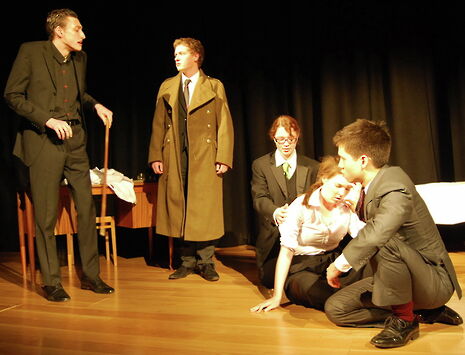Theatre: The Duchess of Malfi
This week at the Howard Theatre, The Mighty Players transport John Webster’s The Duchess of Malfi to 1930s Italy. This iconic play is well-transposed into this era, (despite a single plague-reference) and last night, the production team handled an unusually long student play with impressive professionalism.

The great accomplishment of the performance was the development of a sense of instability as the night wore on; aided in no small measure by the lighting scheme, which helped to illustrate Ferdinand’s (James Barwise) credible descent into madness, as his eyes became black pits under over-head spot-lights. Barwise’s manic physicality and conviction generates a hypnotic, compelling character. His love for his sister is cogently disconcerting, derived from a disquieting mixture of lust and lunacy. Unfortunately, much of Webster’s work was forgotten in his delivery; but what we lost of Webster, we gained in Barwise’s stage-presence. The dynamic interaction between the brothers; Ferdinand’s frenzied quivering violent episodes contrasting vividly with Cardinal’s creepy composure, thoroughly energised the stage. James Swanton, a lanky figure, wielded a comically small cane with panache throughout, and spoke with a mesmerising intonation, oozing a sense of control, which made witnessing his disintegration into regret and guilt all the more enjoyable. The Duchess (Rose Paine), was effective in her refusal to commit to high emotion until the climactic moments, adding a valuable sense of progression to the tale. Her eventual explosion into rage and despair was therefore all the more moving, as was her serene approach to death.
It was unfortunate that Lewis Macdonald, as Bosola, began the play as such an unwilling accomplice to the brothers, statically embittered before any significant events. Beginning as such eliminated any potential for his character to advance, and so there could be no metamorphosis into higher levels of emotion to stimulate his search for revenge. Rather, he maintained a steady level of malcontent, conveyed in the same emphatic tone in his frequent asides to the audience. Webster’s poetry wasn’t lost in his monologues; although his delivery varied little, it was always well-paced and naturalistic. Oliver Marsh as Antonio was also a good communicative actor, but some scenes between he and Delio (Robyn Lowe) lacked energy; Lowe ran through her lines too speedily, eroding opportunities for proper interaction between the characters.
Members of the supporting cast featuring strongly gave a rounded feeling to the performance. Lise McNally, as the Doctor, had a small part, but exacted herself with confidence, creating a spirited scene (including a brawl with Ferdinand) which broke up the main plot. The strong devotion of Cariola (Laura McDonald) to the Duchess augmented the tragedy and the horror of the scene in which they are murdered. From the moment the light floods the stage at the beginning, to the last arresting blue-lit frame, this performance of a re-contextualised classic comes highly recommended.
 Comment / Plastic pubs: the problem with Cambridge alehouses 5 January 2026
Comment / Plastic pubs: the problem with Cambridge alehouses 5 January 2026 News / Cambridge academics stand out in King’s 2026 Honours List2 January 2026
News / Cambridge academics stand out in King’s 2026 Honours List2 January 2026 News / Cambridge businesses concerned infrastructure delays will hurt growth5 January 2026
News / Cambridge businesses concerned infrastructure delays will hurt growth5 January 2026 News / AstraZeneca sues for £32 million over faulty construction at Cambridge Campus31 December 2025
News / AstraZeneca sues for £32 million over faulty construction at Cambridge Campus31 December 2025 Interviews / You don’t need to peak at Cambridge, says Robin Harding31 December 2025
Interviews / You don’t need to peak at Cambridge, says Robin Harding31 December 2025









